This page is an automated translation of /nl/marquesas1.html and is awaiting a manual review.
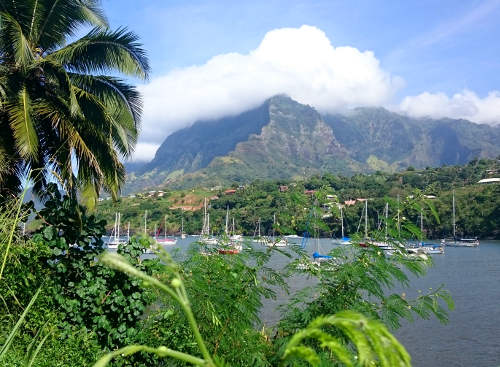
After more than a month at sea, the sight of the Marquises is breathtaking. The mountains are green and the fresh smelling vegetation looks varied. We sail to Hiva-Oa because you can clear in on this island and the other boats from our radio are or will arrive here. After a month of working together on the radio, we are curious about the faces that belong to the voices from the radio and we would like to meet everyone personally.
When we finally go ashore after arriving on the island of Hiva-Oa, we are in the middle of the beautiful nature that we have already seen from the boat. It is beautifully green, fresh and fruity with a rich biotope and many beautiful palm trees. To get to the village, we have a fairly long way to walk and we are looking forward to it, walking under the many beautiful palm trees with the view of the imposing steep green mountains is not a punishment. After less than a 100 meter walk, a car stops and the driver asks in French if we might want a lift? "Non, merci beaucoup!" Ilona immediately laughs and the man waves happily and drives on. How nice that they stop here to ask if you want a lift but we would like to walk now, after such a long time on the sea.
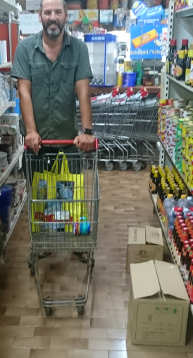
Shortly and well, we meet a man and a woman who come from an orchard. They ask us if maybe we want papayas. "Oui, bien sure, but is that possible on the way back?" says Ilona, but she immediately gets a few large papayas in her hands. "Non non non, the woman says, we don't need any money for it, you can have them in no time. There is enough! Bon appetit!". Ilona's face lights up and she thanks the people appropriately. Wow, what an entry into French Polynesia !! The books we have read do not appear to have exaggerated that the people are very nice and generous! We happily walk on, sniffing out the fragrant nature. It is really very beautiful here, green and wild. Perfect? Yes, except that it is actually very hot ... We sweat ourselves badly, probably partly because we are no longer used to the movement. When a car stops a little later, we give in and say we like to hitch a ride, thanks! The car is luxurious, most of the cars here look very good, well maintained and quite new. The chairs are provided with extremely colorful and cheerful upholstery that matches our first impression of the Marquises.
In the village we cleared at the gendarmerie, where a Polynesier in French uniform helps to fill in the form with a smile. He jokes all the time and in a moment the formalities are fulfilled surprisingly easily and we have never had such fun clearing customs before. They can learn something from this everywhere - and certainly on the Galapagos!
We had already read a lot about it, but the people on the Marquises are indeed extremely friendly and generous. Hiva-Oa is a beautiful island but the small anchorage is overcrowded and the water is cloudy here. Not polluted, but visibility is just a bit poor due to all kinds of plant material and sediment floating in the water. That is especially unpleasant if you know that there are also sharks and the like swimming around that you cannot see. After a month at sea, we especially need some exercise and a refreshing dip every now and then. After we have celebrated the necessary parties with the other cruisers we go to Hapatoni on the island of Tahuata where the water is very clear and you can snorkel fantastic.

Tahuata
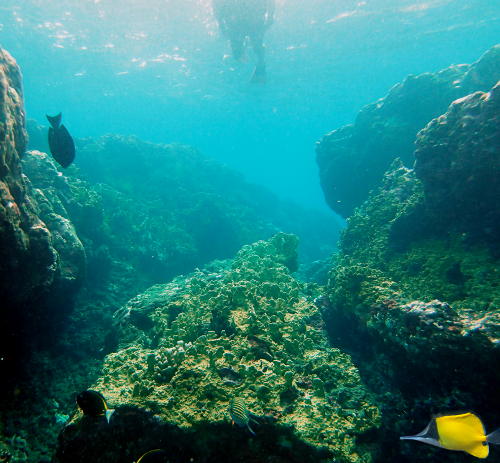
The snorkeling at Tahuata is great indeed! Super clear water and we all see new types of fish, coral and vegetation in front of us. We see a manta ray and a small shark passing by. Many colorful smaller fish swim all around us. We also remove the growth from the boat again because since the Galapagos a lot of fauna and flora has been added.
Our drinking water supply is getting a bit tight. We would have liked to have some water in Hiva-Oa but according to the gendarmerie the water would be better on one of the other islands. We do have a water maker, but it has a small capacity and with this we mainly make the water that we drink during the day. Then the water is nice and fresh and it tastes much better than the water that has been sloshing around in the 400 liter tank for a month. But unfortunately our water maker needs maintenance and we either have to drink the tank water or get somewhere fresh water. At the end of the bay is a small village and we ask the first man we see if we can get some water somewhere. Of course, come along! While the water flows into the large water bottles, the man starts to pluck diligently in his orchard. "There is enough, take it with you!" He calls his son and sends him into a tree to drop some other fruits. Our bag is bulging and we ask what it costs. "Money? No, we have enough fruit!" We insist a bit because it is quite a bit much that we have received. "Well, you know what, if you want to give something, just give something to my son for picking." We have no idea yet what Polynesian money is worth so we open our money pouch. The man picks out a coin worth a quarter and says that this is more than enough and the little guy is overjoyed.
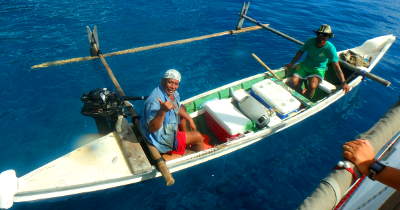
On the way back we pass a canoe in which two men are fishing. "Of course we have fish for you" the fishermen say when we ask if we can buy some fish. But when we ask what it costs, they say they don't need money. Maybe we can exchange something, the fisherman suggests, and asks if we have beer. We offer two cans of beer and tell them to see how much fish they want to give for that. We get no less than five fish from them. We find a good deal and they probably do too :-) That same evening we have a mini party on several catamarans, first we drink a sundowner at Lumiel and then we can sit down at the table at Ta-b, the big cat of that party in the Galapagos. Jane has cooked for us as a thank you to Frans for solving their radio problem; the whole crossing the reception of their radio did not work and they are of course very happy that it now works again. Because we got so much fish from the fishermen and Jane and Russell from Ta-b are very nice company, we invite them again the day after to come to Cobben and it will be fun again.
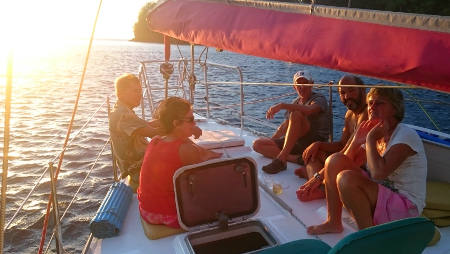
The next day we are invited by a nice new couple, one from Australia and the other from South Africa and together they have a boat that is 55 feet long (Omweg is about 38 feet ...). The sundowner is so cozy that Lisa spontaneously invites us to stay for dinner. It is the norm among cruisers for everyone to do and bring something, both for dinners and sundowners, so Ilona quickly jumps into the dinghy and picks up some leftover already cooked rice and a spicy fish curry. Everyone does a little bit and together you have a fantastic meal. Then Eliana, the boat of the singer Dave enters. He knew we were here and invites us to dinner on Eliana the day after as a thank you to Frans for helping him (again) with his radio. It will be very cozy again and the food is delicious but now we have been socialized for a while, haha it will still be busy! We are therefore quite happy if everyone leaves the bay and we are practically alone for a while. Now some time for the locals and the cruisers, we will certainly meet again.
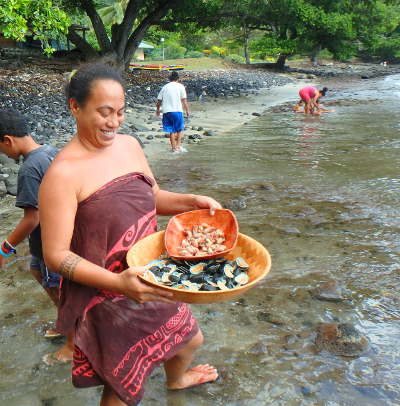
On our next visit to the village, we notice how neat everything looks. There is no waste, the houses are simple but well maintained and the paths are neatly swept. There is no asphalt, all paths are grass or a combination of stone and sand. Much use is made of wood and all the posts of the various constructions are creatively worked with beautiful wood carvings. The Polynesians are very artistic and decorate everything; wood, bones, and even their bodies. They are also known for their beautiful carvings and tattoos. Walking through the village we see two women working on a large bowl on the waterfront. They show that they collect a kind of shells with edible content. The bowl is already well filled and she asks if we want to taste it. Before the trip started, I made a commitment to at least try the food offered and with that intention in mind, I accept the offer. She shows me how to eat the animal and to be honest it tastes surprisingly good. It seems appreciated that I try the food and we are invited to watch her husband work on wood and bones. Her husband's upper and lower body is tattooed and looks very imposing. Well, I'm not normally a fan of tattoos, but these people look really beautiful, they have just the right skin color for it. The art of tattooing was invented by the Polynesians and it is the sailors who brought the tattoos to the rest of the world with an er, varying sense of taste.

Besides French, Cyril also speaks English very well and he knows a lot about the Marquises. He is an artist and he makes the most beautiful arrangements of wood and bone. Twice a year he has an exhibition in Tahiti and he seems to be very successful. A little later Cyril says that Ilona should stay with his wife for a while and that we will get some fish in the meantime. We are invited to lunch just like that! But when we are invited somewhere we do not want to arrive empty-handed so we first go to our boat. We ask if we can bring some beer or wine but our host starts to laugh dismissively. It is the sailors who introduced booze, but it does not bring much luck to the Polynesians. They have difficulty breaking down alcohol and are easily addicted. He used to drink but it always gave him a headache and he is now completely done with it. Do you prefer a fruit juice?
On the boat we frantically search for suitable food to take with us. Fruit juice from a carton is actually strange to bring to people who pick fresh fruits everywhere and make delicious drinks with them. The rest of our food cannot compete with the food of the Polynesians; we have tins and glass jars with non-perishable stuff, but that's not really something you take with you when you're invited. We put some things in the bag anyway in the hope that they will at least appreciate the gesture.
Once back, Cyril asks if we happen to like bananas too. Not for a meal, but to take to the boat. We do want to buy bananas, we say, but Cyril is laughing. "Bananas are not things you charge money for. Look, the whole street is full of them, they are weeds, they are getting more and more." Armed with a dangerous looking machete, he walks to a tree and cuts down an entire shoot. A large comb of bananas falls to the ground. It contains about seventy bananas. He pulls a few less beautiful - but by our standards very edible - bananas and throws them on the verge "for the chickens". The comb is for us, "Please take it!"
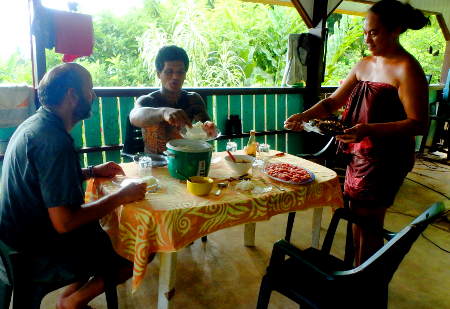
In the meantime, dinner is ready. Half of the house consists of a huge veranda with a view of the ocean. And of course the dining table is outside on the veranda, why would you ever want to eat inside? The food is different from what we are used to but is truly delicious. There is tuna, both raw and fried and both varieties taste great. It is Ilona's first time that she eats raw fish, but a little later she serves again because beyond expectations, it tastes great. "We eat fresh fish every day," says Cyril. "We do have a freezer, but fish doesn't get any better if you freeze it, so we only use it for the bread, which unfortunately has now run out." Life is good on the Marquises. Cyril does have experience with Europe, as he had to do military service in France. A bit of a sick state that the Polynesians are being snatched from their culture to serve in the military in France. Cyril knows that it is cold and that everything revolves around money and he is happy to be back on the Marquises.
We hear that once every three weeks a large boat comes with tourists. Those tourists just walk across the island and then go back on the boat, because there are no catering facilities in the village. The whole village then walks out to sing and dance for the tourists. I ask whether the tourists pay for it or else the tourist organization? But no, no one is paying for it. Why would you wear yourself out, I wonder, but I swallow my Western mentality just in time. "Look, the tourists like to see us dance and sing so we like to do that. That's our culture and it's a tradition that we provide visitors with everything they want."


Birthday party
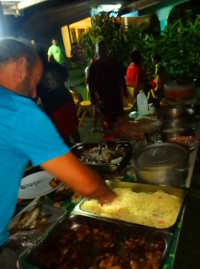
Because we thought our contribution to the meal was a bit meager and we have now discovered that our hostess' bread is finished, Ilona bakes a bread with cinnamon, honey, cloves and raisins on the boat and will bring it the next day. As it turns out, a large part of the village has tried the bread and it turned out to be very popular! We are also invited to a birthday party of Cyril's father and Ilona bakes another bread to take away, this time one with garlic and Provencal herbs and adds a sauce so that the bread can be dipped in the sauce . It is received enthusiastically, until a few older ladies taste the sauce. They take a big bite, then turn red like a beet, open their mouths and wave their hands fanatically. They shout something in their native Markesian language and a bottle of water is quickly fetched to extinguish the fire. Ilona looks on in horror as her sauce turns out not to be so popular. Oops. The ladies who have not fallen victim to the spicy sauce laugh a lot and do their best to explain that they are not used to spicy food. They don't like spicy here. Richly spiced but spicy, no! And that while for the sauce, the peppers are used that grow everywhere in the wild here. Learning moment ....! Fortunately, everyone thinks the bread is very successful.
The party is of course held outside and a large table full of all kinds of goodies is ready. Many people have gone out of their way: various kinds of fish, chicken, a pig has been slaughtered, there are shellfish and of course there are many products that contain all kinds of fruit. Two forks are quickly arranged for us and we discover that no one else has a fork! "Um yes, in the Marquises people eat with their hands!" Cyril says. Well ok, if that's the custom here, we will too! Except with a knife and fork we can also eat with chopsticks, but with just your hands it turns out to be more difficult than with chopsticks, oddly enough. Just try eating rice with a thin sauce and strings of spaghetti a little decent with just your fingers. No alcohol is served at the party, but homemade lemonade is. It is very pleasant and the people here like to celebrate a party. Still, the party ends early because people here live with the sun, even though they have electricity in every house. At nine in the evening, about three hours after sunset, the table is cleared and we leave for our boat.
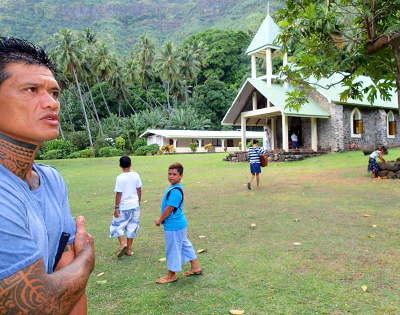
Church
The next day is Sunday and we go to church. Not that we are religious, but we had heard here and there that going to church here is an experience in itself. The people here are Catholic, but they have made their own cultural turn. Not "through our fault, through our fault" etc. but they make it more of a happy party. No black clothing, but brightly colored clothing and beautiful flowers in the hair. No Gregorian chant, but Polynesian songs. No organ but guitars and a drum. No chorus; the churchgoers sing themselves, and not mumbling as in the Netherlands, but louder. There is no conductor, but there is polyphony and everyone seems to know when and how a part should be used. A pair of sneakers protrude from under the priest's habit.
Guided tour
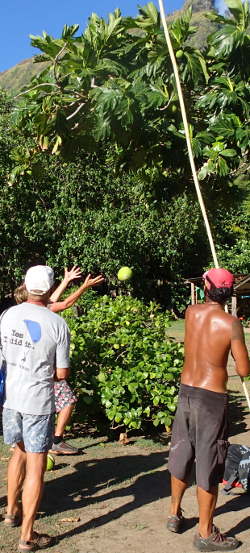
We are also invited by someone for a tour so the next morning we swim to the coast. Because our host has a self-built house directly in the forest behind our boat. The crew of the Moonraker, an English boat that has now come to lie next to us and whose son was our linehandler during our passage through the Panama Canal, have also been invited. Again an impressive tour, in which a lot of attention is paid to everything that grows on edible along the way.
We climb up the mountain and are a long way when Ilona realizes that she has forgotten her camera ... By chance there is a horse grazing along the side of the shoulder on a long rope. As a joke, Ilona says she will sit on it for a while to pick up the camera, obviously not serious but the man, Tii, says it's good! He unties the rope and leads the horse to a stone that serves as a step. Ilona gets on the horse as if she did yesterday and rides off without a saddle and dressed in a skirt. The rest continues and when Ilona is back, the horse is simply tied to the new place on the long rope, that's how it goes here and the horses (but also the goats and pigs) pretend that it is quite normal. At the end of the tour, our bags are bulging again with the fruits that we pick up or shake from the trees.
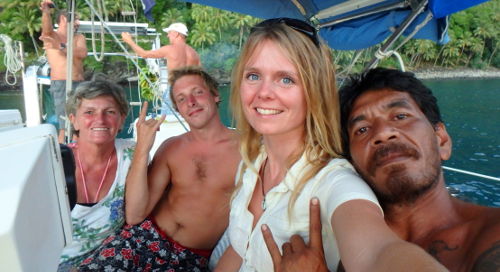
Tii has a suggestion for something in return, whether it would be possible to get such a good bread? And actually he also wants to have a look at a boat, so it is soon decided that we will have a BBQ at Moonraker. Our Polynesian friend will provide half a goat, we will bring a fish curry and rice made by Ilona and the Moonraker will provide salads. It will be very pleasant, but despite our warning, the Moonraker is too generous in our opinion and soon nothing intelligible comes out of Tii. Fortunately, the trip back home with a tough landing on the rocky embankment goes as it should and the next day we see our friend scratching through the forest again.
Return
We leave Tahuata to go to Fatu Hiva, but because we want to go to Ua Huka after this and Tahuata is in between, we decide to spend the night at Tahuata, at Hapatoni where we were received so nicely. After a week at Fatu Hiva (a report on this in the next part) we come back to Tahuata, with an orange. Because someone on Tahuata had asked for an orange from Fatu Hiva because on Tahuata they don't have oranges and would like some seeds to plant. We don't really feel like going all the way to the village because it is also late and it won't be long before it gets dark, so we decide to go to Tii who lives right behind our boat in a self-built house and then he must give that orange to the person who asked for it.
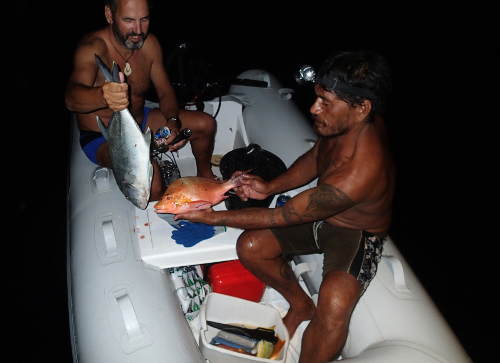
Tii is happy to see us again. "Could you still use some fruit and vegetables?" he asks. Well, we can, because the bananas are finished and for the rest the stock has also dwindled. Tii takes a long stick and we tap two papayas from a tree. One to take to the boat, the other cuts Tii into pieces and we eat them together on the beach, while looking out over the ocean and Omweg. "Maybe a drink too?" asks Tii, climbing deftly into a coconut tree and moments later three coconuts plop to the ground. With his machete, Tii peels the top of the coconut and a little later hits a lid off, leaving a hole through which you can drink. There is a liter of coconut milk in such a coconut, so by the time we each empty our coconut the thirst will be quenched. A very large comb of bananas is still being harvested and then it is time to go back to the boat because the sun is almost setting.
It is actually a shame to just leave again and we actually want to invite Tii for a meal, only we have no fish anymore. "No problem, just light the BBQ and we will get some fish" shouts Tii. We look at him in disbelief. Is that really that easy? While Ilona and I take the dinghy off deck and put the outboard motor on it, Tii sneaks into my fishing box and makes two fishing lines where each line has two hooks. Fishing rods are not necessary. He points to a spot above the reef where I have to sail the dinghy to and once there he drops the line into the water and tells me to do the same. The line drops down but does not stay there because the line must be picked up again immediately. I feel resistance ... and it turns out there are already two decent fish hanging from it, as well as on the line of Tii. I can't believe how easy it is! We put the lines in the water again and immediately retrieve them ... and fish are hanging on again! With a large amount of fish we return to the boat and Ilona is also amazed how we come back with so many fish in such a short time. After the meal there is still quite a lot of fish left and we ask if Tii happens to have a refrigerator because then he can also take a fish with him. But no, it doesn't have a refrigerator and besides, why would you want to save a fish for the next day? Oh well, it is, you can just as easily pull a fresh fish out of the water again. But we would like to keep the leftover fish, so the drinks from the fridge have to be cleared to make room for a few bowls of fish. "Oh yes, there is a party on Saturday, with lots of food, dancing and music. Do you want to come too?" asks Tii. It seems like they are partying all the time. But unfortunately, we had already postponed our departure for a party and although Tahuata is really great, we still want to see a bit more before we have to leave the Pacific again. The next morning we sail early out of the anchor bay. Would we ever come back here?
Cockaigne
All in all, we stayed in Tahuata for over a week. Both under and above water the landscape is enchanting, the people are nice and we actually reluctantly sail away. We especially enjoyed the contact with the population.
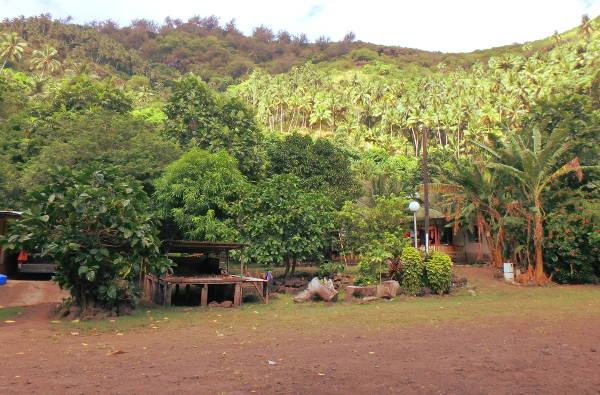
A Marquis village is somewhat reminiscent of a Hobbit village as outlined in the trilogy "Lord of the rings". A rolling green landscape, with houses on it that at least half consist of a large veranda. Despite the available space, the houses are close together and we cannot see where one plot ends and another begins. They probably do not know this themselves and they do not think "in lots". Piglets, chickens, dogs are everywhere and there are fruit trees, coconut palms, banana trees and other food-supplying vegetation everywhere. These people live in a land of laziness, hardly have to make an effort for food and use their time to develop culturally and artistically and, like the Hobbits, have partying, dancing and singing high on the agenda. They are social and are just nice because it is more fun to be nice to each other. Money is not so important to them here, is our impression, which makes society as a whole different. There is no poverty here, there seems to be enough money but there are no shops and the people here do not really know what to do with money. People have everything they really need, but they just don't need that much here. Every house has a telephone, but almost everyone you would like to call lives within walking distance, some have a freezer but what do you throw in there if you can pick up, pick or catch fresh produce every day, and cars are also there, but are not used frequently (where should you go), there is electric light but when it gets dark people just go to bed. The people who live here do not seem to be very docile for consumption and greed has not really taken hold here, despite the availability of money. We've tried to buy or pay for something several times but we just don't get the chance to spend money here; everything is given away or, if necessary, exchanged for some beer, fish hooks or other trifles.
Part II about the Marquises is in the making, we have been to Fatu Hiva and we are far from tired of the Marquises! But what we have already seen alone, the crossing across the Pacific to get here was more than worth it!